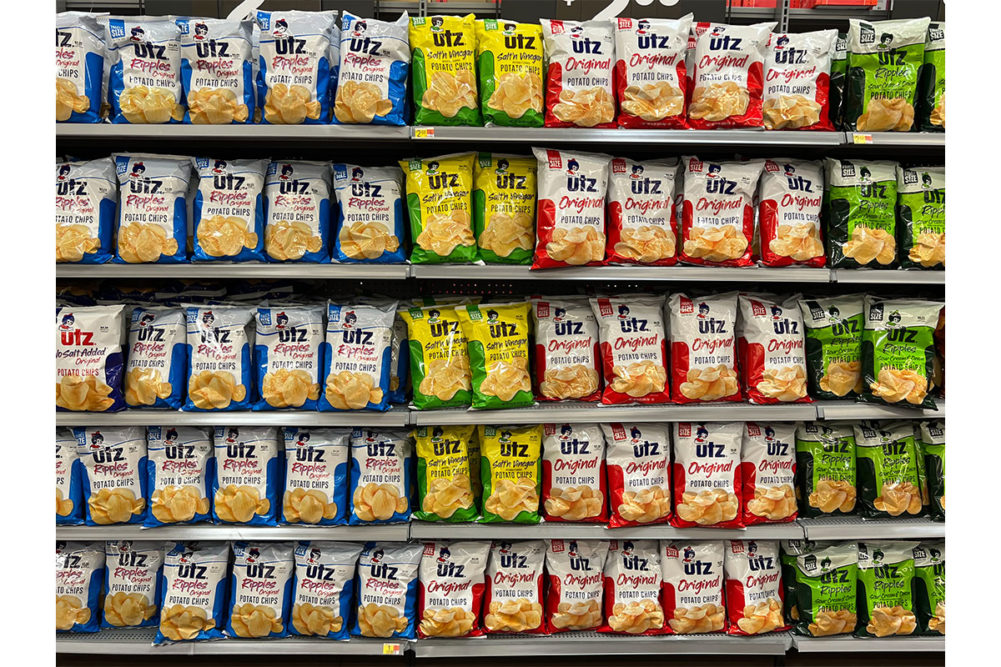HANOVER, PA. — A combination of shifting consumer trends and aggressive actions taken to optimize the company’s supply chain and portfolio have led Utz Brands, Inc. to lower its near-term sales outlook.
Utz cut its forecast for net sales growth for the full year to 2% to 3%, down from 3% to 5%. Full-year adjusted EBITDA growth was reaffirmed at 8% to 11%.
The decision to lower its outlook comes in the wake of the company’s announcement it would be closing its manufacturing plant in Hanover and selling idled manufacturing plants in Gramercy, La., and Birmingham, Ala. Utz also has made the move from flex multi-pack and variety pack bags to boxes. The actions are expected to simplify the company’s existing plant network and streamline its operating structure by consolidating volume into a smaller number of facilities, which will reduce costs.
But, at least initially, the changes have put a strain on volumes, said Howard A. Friedman, chief executive officer.
“Changes like this at speed doesn’t come without challenges, and these collective actions impacted our second-half volumes more than we anticipated, with a disproportionate impact to our Foundation brands for which retail sales declined about 9%,” Mr. Friedman said in a Nov. 9 conference call with analysts. “The Foundation brand most impacted was Golden Flake, which until June was made in our Birmingham, Ala., plant. In summary, we underappreciated the complexity of integrating Golden Flake into our Hanover facilities and deploying finished goods to local southern markets. As a result, we fell behind meeting our case flow requirements until October.
“As we continue to explore opportunities to optimize our supply chain network, there are several key learnings we will apply from this experience. First, recent plant closings have provided us with insight and best practices that will inform our approach to future network optimization decisions. Second, we will be more conservative with respective inventory safety stock levels. And third, we will look to trusted co-man partners to provide redundancy. Over the years, our team has acquired and integrated several manufacturing facilities without incident. While closing a plant requires a modified approach, we are now much better prepared for future network optimization.”
Another factor contributing to the lower sales outlook involves consumers increasingly looking for value, Mr. Friedman said.
“We are seeing this manifested in a few ways to include shopping for absolute price points, trading to private label, and channel shifting,” he said. “Today, consumers can find Utz across all classes of trade to include value channels, and we are focused on how we can deliver more value regardless of the shopper’s definition. This includes being laser-focused on our price pack architecture strategies up and down the ladder, evaluating smaller pack sizes at key pricing thresholds, introducing more value options, increasing usage occasions, and better leveraging the breadth of our product assortment to meet retailers’ needs. Importantly, our hybrid model and DSD capabilities enable us to implement these strategies across channels with flexibility around merchandising, product placement, and timing of events.”
Net income in the third quarter ended Oct. 1 totaled $16.2 million, equal to 20¢ per share on the common stock, up sharply from $1.5 million in the same period a year ago. The most recent quarter included a $16 million gain from the remeasurement of private placement warrant liability in the quarter versus a loss of $3.7 million in the prior-year period.
Adjusted net income, meanwhile, totaled $24.6 million, equal to 17¢ per share on the common stock, up 9.5% from $22.5 million, or 16¢, in the same period a year ago. Adjusted EBITDA totaled $52.1 million, up 9.2% from $47.7 million a year ago.
Net sales increased 2.5% to $371.9 million from $362.8 million. Mr. Friedman said retail sales increased 3%, led by growth of 5% in the company’s Power brands (Utz, On the Border, Zapp’s and Boulder Canyon).




